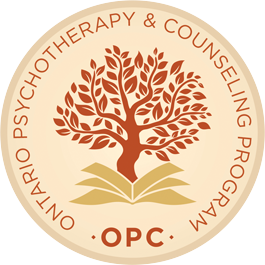The Ontario Psychotherapy and Counseling program supports an open, integrated and lively “spirit of education.” OPC, the faculty and facilitators believe that emotional, spiritual, intellectual and psychological energies drive the learning process for the student learner and the facilitator, mentor or teacher. We hold the belief that when the student hears the call to become a psychological healer; all of the potential ingredients to carry out this vocation already exist within the initiate. Through deeper awareness, understanding and skills development they can become more attuned to clients’ needs and more effective in their practice.
The student chooses the Ontario Psychotherapy and Counseling Program in order to learn about the ongoing therapeutic communications that are important to achieve inner and outer balance for themselves and their clients, and thus to carry out the work of their inner healer. We choose the word ongoing because of our understanding that learning about the therapeutic communications for fine-tuning the therapeutic process for both the student and the teacher is a life-long process, far exceeding the time spent in the actual training program. Because both the faculty and the students continually gain new knowledge, the OPC program itself is always in the process of changing and evolving. Through relationships between the client and therapist, the learner and teacher/facilitator and students in our group processes, we expand our capacities by mutually influencing each other with our respective reflections and insights. These reflections and insights can be worked out further in the learning groups and supervision sessions.
OPC incorporates the spirit of education that supports using the unique spirit, wisdom and intuition that are configured within each person. We refer to students often as Associates because we all belong to the same collective community and as such are all interconnected. We are working for the common goal of increased health and healing within our clients, our communities, the planet and ourselves. Some students may have already had the valuable experience of engaging in personal therapy prior to admission to OPC. Students are required to work on their own growth and see a psychotherapist, as long as they are in the program.
OPC Associates focus on continued understanding and healing of their inner and outer worlds through exploring new ideas, available information, self-reflection and respectful sharing with each other and with the school’s faculty, facilitators and supervisors. Through this process, wounded feelings can be transformed into strengths and knowledge into practice. This transformative experience is provided for the students as a model for working with future clients. Various techniques, modalities and study areas are explored within the program as helpful approaches and tools to assist in guiding the counseling and healing process. We believe in the potential and courage involved in this depth of exploration, as it often requires openness and hope until new knowledge is received and integrated. By removing barriers to learning, we can release new psychological strengths, insights and knowledge, subsequently releasing our human potential through new pathways. Since our body, mind, heart and spirit are embedded in the physical self, we call this “embodied learning from the inside out.” We believe that as blocks are released, awakening of our intuition and new ways to cope and grow occur. As our intuition and knowledge are more and more available, a space often begins to open up for further new developments and creative explorations.
The faculty, facilitators and supervisors of OPC will support and co-create with the students as their unique intellectual, spiritual, emotional and creative selves are unfolding. We hold the belief that all relationships within OPC are co-creative in nature. It is this model that forms the template for reflective, appreciative, scholarly and shared inquiry within the school and many of its approaches for learning.

